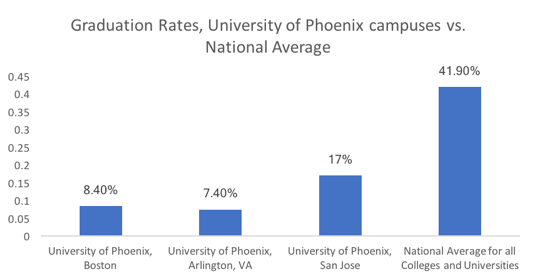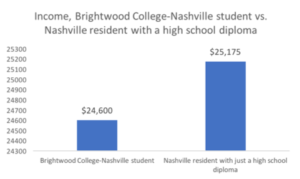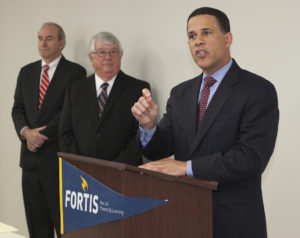
Poor student outcomes at private equity-owned for-profit colleges
March 27, 2018
From report “Private equity’s failing grade: Private equity investment in for-profit colleges”
(Written jointly by Private Equity Stakeholder Project and Americans for Financial Reform)
Like the for-profit college industry more generally, many private equity-owned for profit colleges have failed to provide an adequate education for students despite drawing federal funds and encouraging students to take out tens of thousands of dollars in loans. For example, a 2016 report from the National Bureau of Economic Research that shows that for-profit students experience a “decline in earnings after attendance, relative to their own earnings in years prior to attendance.” Some specific examples include:
A recent study published in the Journal of Human Resources, “Gainfully Employed? Assessing the Employment and Earnings of For-Profit College Students Using Administrative Data,” noted that students at for profit chains do particularly poorly:
“Here we observe worse performance among the chain for-profits: annual earnings declines are nearly double in magnitude for chains (about -$2,400 vs. -$1,200). Employment outcomes are negative for chains (-2.5 percentage points), but show a positive differential for independent institutions (2.0 percentage points).”[i]
The study went on to note that “for-profit attendance does not pass a benefit-cost test and leaves the average student with a loss of about $1,200 over her lifetime [compared to not attending college at all].[ii]
University of Phoenix (Apollo Global Management)
In early 2017 Apollo Education, the owner of the University of Phoenix for profit college chain, was taken private by Apollo Global Management a (then unrelated) large private equity manager. While University of Phoenix enrollment has fallen sharply from its 2010 peak, the chain still enrolled 171,000 students this year, the Associated Press reported.[iii]
Based on federal data, graduation rates at University of Phoenix campuses are dismally low – from 17% at the University of Phoenix campus in San Jose, California[iv] to 8.4% in Boston[v] to 7.4% in Arlington, Virginia.[vi] These compare to national average graduation rate of 41.9% for all colleges and universities.[vii]

Photo: Ryan McKnight (CC BY-SA 2.0)
Several University of Phoenix programs, including its teacher assistant/aide associates degree, behavioral sciences associates and bachelor’s degree, and health information/medical records technology associates degree programs, failed the US Department of Education’s Gainful Employment standards in 2015, the most recent year available – standards that measure whether graduates earn enough money to pay down their federal student loans.[viii]
Students graduating from the University of Phoenix with teacher’s aide/ assistant associates degree earned an average of $18,094, significantly below the average earnings of someone with just a high-school diploma ($25,000). This was also the case for University of Phoenix students graduating with a pharmacy tech/ assistant associates degree ($20,422), another program that failed federal Gainful Employment standards.[ix]
According to the US Department of Education’s College Scorecard website, the average University of Phoenix student ended up with $32,813 in federal student debt. This does not include private student loans.[x]
The University of Phoenix has drawn the most complaints to the VA of any college from students receiving Post 9/11 GI Bill funds.[xi] Of these, most students complained about financial issues (e.g., tuition/fee charges – 323 complaints), followed by quality of education (179 complaints).[xii]
Education Corporation of America (Landmark Partners, Vision Capital)
 For profit college chain Education Corporation of America (ECA) is owned by private equity firms Willis Stein & Partners, Landmark Partners and Vision Capital.[xiii] In 2015 Education Corporation of America significantly expanded by acquiring from Kaplan Education, a division of Graham Holdings Co., 38 Kaplan College campuses and incorporating them into its Virginia College and Brightwood College chains.[xiv] ECA schools enroll almost 60,000 students.[xv]
For profit college chain Education Corporation of America (ECA) is owned by private equity firms Willis Stein & Partners, Landmark Partners and Vision Capital.[xiii] In 2015 Education Corporation of America significantly expanded by acquiring from Kaplan Education, a division of Graham Holdings Co., 38 Kaplan College campuses and incorporating them into its Virginia College and Brightwood College chains.[xiv] ECA schools enroll almost 60,000 students.[xv]
In 2015, the majority (19 of 35) of Virginia College’s programs failed federal gainful employment standards.[xvi] According to Department of Education data, a student at Virginia College’s Greensboro, North Carolina campus, for example, earned an average of $24,400 ten years after starting classes there, less than the average income of a Greensboro resident with just a high school diploma.[xvii] Just 36% of students who attend Virginia College’s Greensboro campus earned, on average, more than those with only a high school diploma.[xviii]
Five of Brightwood College’s programs failed federal gainful employment standards. Another 27 programs were rated “zone” or warning zone, meaning their graduates’ annual loan payments were 20 to 30 percent of discretionary income or 8 to 12 percent of total earnings.[xix] A student at Brightwood College’s Nashville, Tennessee campus earned an average of $24,600 ten years after starting classes there, less than a Nashville resident with just a high school diploma.[xx] Just 38% of students who attend Brightwood College’s Nashville campus earned, on average, more than those with only a high school diploma.[xxi]
Education Affiliates (JLL Partners)

Former Maryland Lt. Governor Anthony Brown speaking at Fortis College ribbon cutting. (CC BY 2.0)
In addition to settling charges with the US Department of Justice that it violated the False Claims Act, eighteen programs at Education Affiliates’ Fortis Institute brand failed the Department of Education’s Gainful Employment standards as of 2015.[xxii]
According the US Department of Education’s College Scorecard tool, a student who attends Fortis’ Indianapolis campus makes just $22,200 ten years after entering school. Just 30% of students who attended the school earned, on average, more than those with only a high school diploma.[xxiii]
[i] “Gainfully Employed? Assessing the Employment and Earnings of For-Profit College Students Using Administrative Data,” Journal of Human Resources, Spring 2018.
[ii] “Gainfully Employed? Assessing the Employment and Earnings of For-Profit College Students Using Administrative Data,” Journal of Human Resources, Spring 2018.
[iii]“Every University of Phoenix location in Florida is halting on-campus enrollment,” Miami Herald, Sept 28, 2017.
[iv] VA GI Bill Comparison Tool, University of Phoenix-Bay Area, accessed Nov 4, 2017.
[v]VA GI Bill Comparison Tool, University of Phoenix-Boston, accessed Nov 4, 2017.
[vi] VA GI Bill Comparison Tool, University of Phoenix-Arlington, VA, accessed Nov 4, 2017.
[vii]VA GI Bill Comparison Tool, University of Phoenix-Boston, accessed Nov 4, 2017.
[viii] Gainful Employment DMYR 2015 Final Rates, US Department of Education.
[ix] Gainful Employment DMYR 2015 Final Rates, US Department of Education.
[x]College Scorecard profile for University of Phoenix, accessed Nov 4, 2017.
[xi]GI Bill Comparison Tool data files, accessed Nov 4, 2017.
[xii]VA GI Bill Comparison Tool, University of Phoenix-Boston, accessed Nov 4, 2017.
[xiii] “Willis Stein & Partners, Landmark Partners and Vision Capital Complete Innovative Transaction,” Media Release, Aug 29, 2012.
[xiv]Education Corporation of America purchases Kaplan College campuses, Media Release, Feb 12, 2015.
[xv]What’s Up with ACICS Colleges?” Center for American Progress, Jun 6, 2017.
[xvi] Gainful Employment DMYR 2015 Final Rates, US Department of Education.
[xvii] Based on median earnings of $25,081 for a Greensboro resident with a high school diploma, U.S. Census Bureau, 2011-2015 American Community Survey 5-Year Estimates. https://collegescorecard.ed.gov/school/?480815-Virginia-College-Greensboro, accessed Nov 4, 2017.
[xviii]https://collegescorecard.ed.gov/school/?480815-Virginia-College-Greensboro, accessed Nov 4, 2017.
[xix] Gainful Employment DMYR 2015 Final Rates, US Department of Education. “Over 800 Programs Fail Education Dept.’s Gainful-Employment Rule,” Chronicle of Higher Education, Jan 9, 2017.
[xx] Based on median earnings of $25,175 for a Nashville resident with a high school diploma, U.S. Census Bureau, 2011-2015 American Community Survey 5-Year Estimates. https://collegescorecard.ed.gov/school/?246202-Brightwood-College-Nashville, accessed Nov 4, 2017.
[xxi]https://collegescorecard.ed.gov/school/?480815-Virginia-College-Greensboro, accessed Nov 4, 2017.
[xxii] Gainful Employment DMYR 2015 Final Rates, US Department of Education.
[xxiii]https://collegescorecard.ed.gov/school/?458681-Fortis-College-Indianapolis, accessed Oct 15, 2017.
